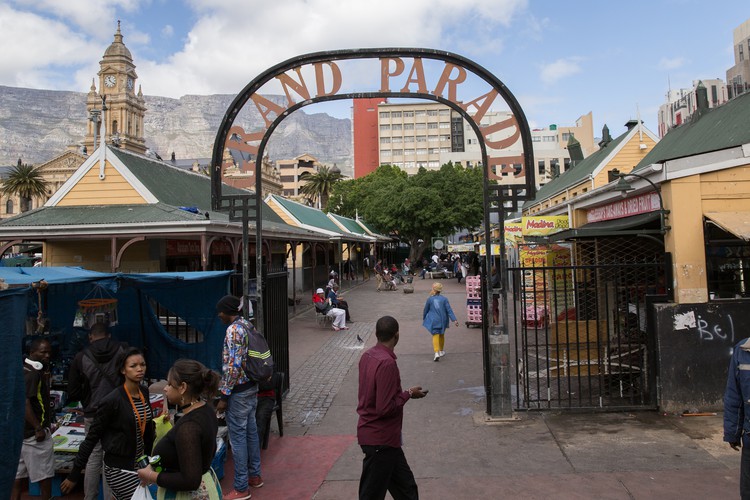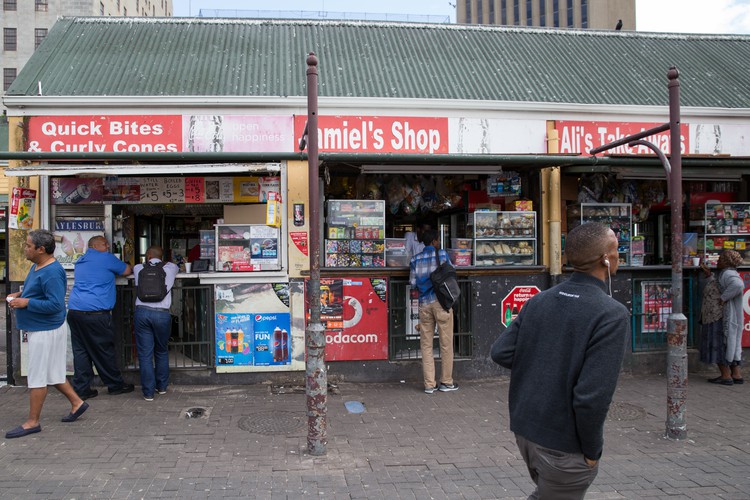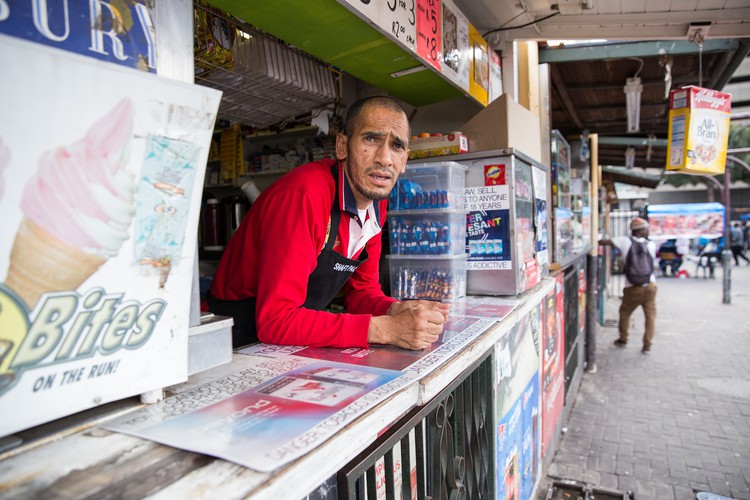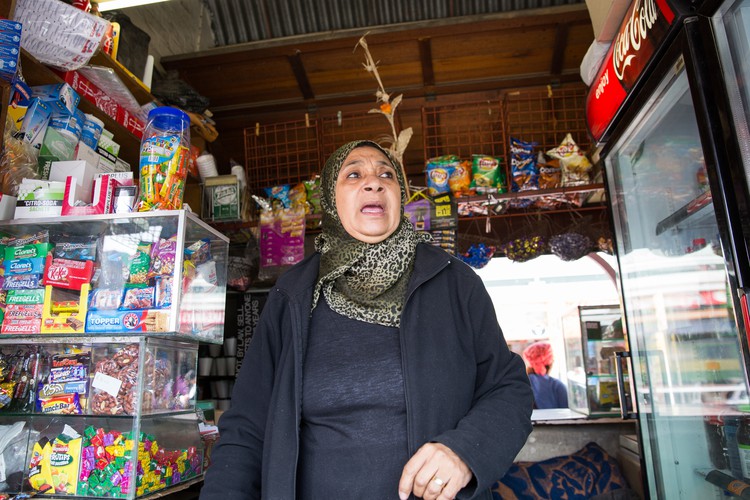
The Grand Parade is an iconic part of Cape Town’s city centre. Kiosk vendors believe the City of Cape Town is trying to push them out. Photo: Ashraf Hendricks
9 October 2017
Vendors on the Grand Parade in Cape Town are looking for answers after their monthly rentals went up by extremely large amounts with no explanation given to them by the City of Cape Town.
In July, Abdullah Hendricks, who serves as Chairperson of the Grand Parade Merchants Association (GPMA), received his monthly rental statement. It showed that he owed the City of Cape Town R260,721 for the month, instead of his usual monthly R3,400.
According to the City’s invoice, the new amount was calculated by backdating a new rent of R19,435.23 per month to July 2016. Over subsequent months on the invoice, this increased to R25,166 by July 2017. Hendricks’ bill from the previous month, which showed his old rent, also showed that he was fully paid up.
Hendricks says there was no notification given by the City as to why such a steep increase would take place. He has been a vendor selling fast food on the Grand Parade for 32 years. “I’m almost sixty. Who wants to fight?” he says. “I worked hard my entire life to put my children through school. Now it’s time to save for my pension. Now they want to throw me out?” he said.
According to Hendricks, he questioned his bill but was informed by the City of Cape Town that this was his new bill.
Hendricks’s case is the most extreme, but all the Grand Parade vendors we spoke to had huge increases.

Omar Omar’s family has run a catering business on the Grand Parade for 100 years, with him being a fourth generation owner. He said the rent increases are “painful”. “For us to survive here, it costs more than money, [but also] blood, sweat and tears.” Omar’s money owed on rent went up to R120,000 in the sudden increase.
Mayoral Committee Member Stuart Diamond explained to GroundUp that an audit had found that the rents had been too low. City staff then attempted to correct the situation by backdating the rents. The subsequent massive rent increases were a “bureaucratic error” said Diamond. He said he told the officials these were “ridiculous amounts”. He asked them to go back and do a property valuation of the area. He also committed to meeting with the vendors.
The rental increases come on the back of a dispute between the vendors and the City over how to carry out an upgrade of the Grand Parade.
The 23 vendors whose families have been on the Grand Parade for 785 years collectively, received letters from the City stating that they needed to vacate their premises for intended upgrades to the area.
 Zaid Davids is the secretary of the Grand Parade Merchants Association (GPMA). He said the vendors support the upgrade, but cannot afford to lose their trade while it is carried out, especially during summer. Photo: Ashraf Hendricks
Zaid Davids is the secretary of the Grand Parade Merchants Association (GPMA). He said the vendors support the upgrade, but cannot afford to lose their trade while it is carried out, especially during summer. Photo: Ashraf Hendricks“We won’t take this lying down,” said Zaid Davids the secretary of the GPMA. “There’s guys going back like a hundred years. Their great-grandparents have been trading there.”
Davids said vendors were given notices in November 2016 to vacate the Grand Parade as the City wanted to pursue upgrading the area. This was the first time traders had heard about the planned upgrades. The City wanted the vendors to close down for six months according to Davids. But this would have been through summer, the traders’ busiest period.
“We are in favour of the upgrades,” said Davids, but the vendors want to be consulted on the City’s plans. Davids said they gave the City alternative suggestions, which included housing traders in city-sponsored mobile units so that vendors would not lose their income while the area is upgraded.
After the Legal Resources Centre (LRC) intervened on behalf of the GPMA, the upgrade plans were halted at the end of March. “We don’t know where we stand,” said Davids. “They [the City] didn’t even have the decency to come back to us.”
Diamond told GroundUp that the City was going to “do assessments” and that “proper mediation” would follow with the vendors.
Vendors are concerned with the safety and state of the Grand Parade. When GroundUp visited the scene, Sumaya Essop, a vendor, was telling two law enforcement officials that they needed to remove a man lying down near her shop.
Farieda Williams, also a vendor, said that when she gets to her shop in the early mornings, she needs to ask people to get away from her shop. But this is law enforcement’s job, not hers, she says. “It’s like a slum,” she said. She said people gamble in the area, and crimes such as pickpocketing and mugging lose her business.
Like Davids, Omar also said they are not opposed to an upgrade because it is much needed. But, he says of the City, “They’ve let this place run into a squatter camp.” Omar said that if the CIty works with the traders on the Grand Parade, everyone could be happy.

Hendricks said that on 25 August 2017, City officials along with 20 law enforcement and SAPS officers stormed the Grand Parade demanding business licences. Both Davids and Hendricks were at their shops when this occurred. Vendors without business licences were issued with R3,000 fines.
Hendricks said that City officials, law enforcement and SAPS officers crowded around his counter and asked for his business licence. When Hendricks questioned why all these officials were needed just to ask for a licence, the officials moved to the stall of a 72-year-old woman.
“She nearly had a heart attack. She thought they were doing a drug bust,” said Davids. “The City is supposed to have records of our business licences, so why didn’t they check their records first?”
Williams, who was present at the scene, said officials came to her shop and asked for her licence. “They said we have 24 hours to get your papers or else get a fine.”
Besides a telephone discussion shortly before publication, GroundUp also received the following written response by Diamond:
The Grand Parade is a public space of great historical significance to the residents of Cape Town and has been host to landmark events that help shaped the cultural, political and economic landscape of Cape Town and South Africa over the centuries.
All Capetonians, local and international tourists and most importantly the current traders have enjoyed all the benefits this asset had to offer over the years. As a dynamic metropolitan city, it is recognised that the City must from time to time re-evaluate the relevance and efficiency of its institutional mechanisms used to govern important public spaces such as the Grand Parade.
Optimising the use of public areas is one of the key objectives of the City and to this end, under my leadership as Mayoral Committee Member, the Grand Parade has been identified as a priority asset which requires revitalisation to ensure preservation of this important asset.
This process will involve a number of activities and will include but not be limited to the upgrading of certain ‘pockets’ of the Grand Parade which will leverage the ability for traders to maximise revenue generation.
In pursuing these objectives, the City must be cognisant of the provisions of the Municipal Finance Management Act, 2003 (Act 56 of 2003) Section 62 (1) which requires the City to manage the financial administration and take reasonable steps to ensure that resources are used effectively, efficiently and economically. While this process is under way, the current users are enjoying the benefit and usage of the asset on a month-to-month basis.
The need for prudent financial management and law and order is in the interest of the city and all who use the Grand Parade, hence the need for the alignment of the accounts to existing lease agreements and appropriate compliance monitoring and law enforcement activities.
I am looking forward to engaging with the individual kiosk and market traders and progressing the discussions towards the future upgrading of the Grand Parade.
Lastly, it should be noted that it is not Council policy to discuss individual business cases through the media.